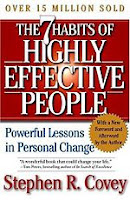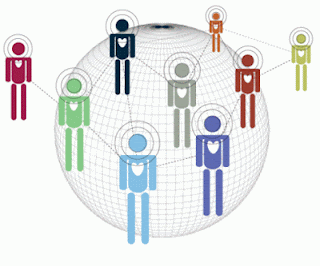 |
| Publishers balked at my version of this book. |
7. Too Independent. Maybe it’s that good ole’ American ideology, “Don’t tread on me,” but I don’t like people telling me how to do things. Tweaking things is one thing, but there’s a big difference between coaching and controlling. When I worked for a fortune 500 company, the middle managers would say things like, “Don’t tell them the interest rate is 27.9%, tell them it’s 0% if you pay off the balance within 28 days.” “Well, sir, that sounds a little deceitful to me…” I would say, and that’s when I stopped being a rising star in the company, and became the guy who got transferred to different departments every other quarter. “If you could just shut up long enough, close off all your feelings, natural instincts, moral qualms, and intellectual need to know, you could really go somewhere with this company,” they might as well say. Sorry, no can do.
5. Too Time Deficient. Raising kids is a full time job, but to the moderately successful person, it is just one, of the hundreds of things we do in a day. Between making healthy food snacks and meals, hurrying them off to school, fighting traffic, actually working, doing errands on the way home, some of us don’t have a moments rest until we sit down at dinner. Sometimes that can be at 8:00, and the kids should be in bed. Then we try and communicate with friends or family online or on the phone, hope there are no emergencies or late bills that didn’t get paid, and before you know it, it’s midnight and you still haven’t replaced the D battery in the smoke alarm whose incessant but intermittent beep can wait another day. Hopefully your sanity is fire retardant.
4. Too educated.
It seems like everyone has a degree nowadays. The gas attendant at Costco, the waiter at PF
Changs, the guy dancing with a Little Caesars sign, all have advanced degrees
in fields nobody cares about. My best
friend has a sociology degree, and I often joke, “The only thing that’s good
for, is to know how angry you should be at the injustice of it all.” The jobs aren’t there for our degrees, so the
mildly successful finds work elsewhere, hoping, dreaming for a chance to put
his/her learnings to practice. So we
work, and complain about it, but don’t have enough time or resources to
actually make anyone notice (especially the student loan collectors who will
gladly put you on deferment, but not actually listen to your issues). The worst aspect of it all, is the overly
educated will see company newsletters and notice all the typos and grammatical
errors, or listen to managers speak who have no public speaking skills, or see
data with easily changeable outcomes for the better, and then be told by their superiors, “Somebody threw up on aisle
six, could you clean that up? Thanks.”
3. Too entertained. Rather than start grassroots movements to change the problems, like our parents' and grandparents' generations of the 60’s and 70’s, the current working generations find meaning in entertainment. Counter culture guru Timothy Leary coined the phrase, “Turn on, tune in, drop out,” in the late 1960s. Leary later said that the “PC [personal computer] was the LSD of the 1990s.” Unarguably, the PC has lead to much more productivity than even the greatest acid-inspired creativity spell (yes, even Yellow Submarine), but has also been just as addictive and isolating. Instead of hippies getting together for love-ins, overworked exhausted people are searching for love on Match.com. Or they are losing hours, days, and weeks to virtual gaming worlds. If gaming isn’t a vice, there are still the movies and television and music. And then there is the actively showing off crowd, the brave braggarts who take a weekend off to climb Mt. Hood, or bike across state lines. And then they pretend it’s no big deal when they ask about your weekend, “Oh, you stayed up late to watch the Game Of Thrones finale? I spent the evening in an ice bath after running my third marathon this year.” But whether their eyes are blood shot from a 30-hour World of Warcraft marathon, a trip down bong-water memory lane, or from swimming in the ocean in an Ironman triathlon, they aren’t ready or willing to give the same kind of attention to the workforce that would make them MVP of their job.
 |
| Mom...I'm bored. There's nothing to do!! |
2. Too socially connected. I would argue that one reason the poor are
poor, is because they don’t know how to interact nicely with other humans (just
watch an old Jerry Springer episode, or a current UFC fight); and many of the
rich are rich, because they don’t care about other people. But the moderately successful are both
socially skilled and usually show genuine empathy towards other human
beings. They take days off work to stay
with a sick parent, spouse, or child at the hospital. They find time in the summer to go on group
camping trips, family reunions, and rent beach houses with friends. The mediocre worker would gladly trade
overtime for unpaid vacation time. And
maybe spend that whole vacation at home, liking other people’s active statuses
on Facebook.
 |
| Orange and blue, grey and green, they are precious in his sight. Jesus loves the little avatars of the cyber world. |
 |
| And you thought you'd never see a Ziggy cartoon ever again. RIP Tom Wilson. |
To sum
up, the moderately successful are the way they are, because they care about
others too much; want to enjoy their free time with friends and family or
actively pursuing individual lifelong dreams; Are overly knowledgeable, but
without enough time or resources to actively change the world; And too independent
to ever join forces with a movement to actually cause change in the world.
The only steps to riches and fame necessary are: to sell their integrity to the highest bidder; stop socializing and finding active enjoyment in life in exchange for more hours at work; take a passive role in parenting; get mean; and stop learning universal truths through higher learning and replace them with whatever the company’s hard truths are.
Maybe it's not so bad to be average after all.
The only steps to riches and fame necessary are: to sell their integrity to the highest bidder; stop socializing and finding active enjoyment in life in exchange for more hours at work; take a passive role in parenting; get mean; and stop learning universal truths through higher learning and replace them with whatever the company’s hard truths are.
Maybe it's not so bad to be average after all.




u whine about ur life alot
ReplyDeleteI actually thought it was kind of optimistic, in a round about kind of way. I'm guessing you didn't read the whole thing.
ReplyDeletei read all of them. its not suttle.
ReplyDeleteI love constructive comments articulated with poor grammar, spelling and capitalization. And judging by the "text speak" of the anonymous person, I'm guessing they're not old enough to understand the subtle optimism that this particular post embodies.
ReplyDeleteWell, he's not saying it well but I think he does have a point. I've read everything Chris has written here and the tone of disappointment and burden is somewhat omnipresent. Which is fine, but if he's writing for a potential publishing audience it's kind of a turn-off.
ReplyDeleteum excuse me alec but im a girl
ReplyDeleteThe creativity of this particular post is that it is not "whining" but a commentary on what makes one successful and that in many cases there is a compromise of personal integrity to further oneself in this world. This seems, to me, to be a commentary that success can actually be something that does not result in a monetary gain or "pat on the back" from a a superior whose own integrity may be questionable. There is a quiet praise of choosing this particular path and I believe the satire lies in the fact that it seems that life has dealt a raw hand, but he has played it anyways and has an ace in the hole that is yet to be revealed.
ReplyDeleteAnonymousgirl: Nobody cares.
ReplyDeletePlumbfan: No, I agree. I see what he was doing here. It's just a tone I've noticed over the sequence of essays. And, to be honest, even the defiant tone in this piece seems to me to be a reaction to the aforementioned dark cloud, and therefore in some ways subservient to it.
I appreciate those coming to my defense as I appreciate those question my motives and/or style. It's fine, I'm a grown man, people can say whatever they want to say about me, either anonymously or to my face. My style is my style. I've always said I'm an external pessimist, and an internal optimist; meaning, I don't have hope for the external world, but I have hope for my own place in this world (and hopefully the next). The world has neither dealt me a good hand or a bad hand, but a similar hand to many people right now, and I think I'm trying to say something (about frustration) that many people want to say but don't know how to vocalize and/or find an audience. Whether that makes me publishable or not, I really don't care. I think I already stated that I'm independent; and changing my style to capture a small demographic sounds like advertising to me. And I'm not trying to sell anything other than my views and maybe to a much smaller extent, my faith, right now. But there are plenty of successful, published negative guys: Bill Maher, Christopher Hitchens, George Carlin, Lewis Black--all of whom had a different perspective of the world than I think I am offering.
ReplyDeleteI never meant to criticize you for being negative, because I don't think being negative is inherently bad (and I hate the word. Psychobabble buzzword that, like most, somehow manages to mean both everything and nothing. But the four guys you named (in addition to being stellar atheists) stayed well clear of their miseries and tended to focus on their incredulities, a more rich comedic vein that you yourself have exploited on this page.
ReplyDeleteI guess my only point is existential angst reads. And tires. And I wouldn't be saying this were it just my opinion. Take it for what you will.
Alec, humor is subjective, although I would say I haven't used humor much at all, other than maybe my subtitles to pictures. I guess I appreciate the humor of guys like Larry David and Jim Gaffigan who embrace the oddities of their character, than guys who merely think they are better than everyone (Ricky Gervais among the others I mentioned) else because of their superior brainpower. I've always been more of a "self-defecating" jokester, than a funny quip about life kind of guy. Although, I think George Carlin used humor, intellect, opinion, and a carefully crafted performance to nail home his point; and I appreciate what he did, even if I didn't always agree with the point he was trying to make. The ability to not offend your audience, while wholly offending them, is a hard task to do, and I'm not claiming I know how to do that.
ReplyDeleteI guess what I should maybe sum up a few of my blogs to really say is: I should really be depressed with where I am in my life; yet family, friends, faith, and hope, have reaffirmed what I should already know--That I am valuable member of society regardless of what my bank account or career looks like right now--and that I am loved, and love others regardless of whatever situational chaos is in my life at the present moment. And I'm okay with that. God bless.
I find, the older I get, that I have begun to reevaluate the goals of my childhood. I wanted to be famous, rich and popular. But my time in high school, college, post-college and all the life that happened in between has changed me. I have realized that my goals come at a price I am unwilling to pay. I have realized that in the coure of being famous, I must sacrifice my privacy. In the course of being rich, I must sacrifice my time, family and health. In the course of being popular, I must sacrifice my integrity. I am not what I hoped to be "when I grow up" but I am coming to terms with that. And in the process, I am realizing that I am happier being mediocre than I ever would have been famous, rich and popular. Thanks for further provoking my thought process in this regard.
ReplyDelete1. A P.F. Changs waiter with a degree can be brilliant and amazing. 2. I will always believe that suiting up and and showing up as a parent, wife, daughter and friend is what makes me successful in my life. 3. Chris is a cantankerous old man who won't suddenly become sunny for his publishers, so he may as well crank it up on here.
ReplyDeleteHappiness is relative to success, and that has become a common truth in recent American culture. However, for whatever reason, many societal groups have missed the memo. Sometimes what seems most obvious and evident to many of us, is hidden under a rock for others. Your passion, regardless of tone, can possibly change a perspective or two. What more could a writer want?
ReplyDelete